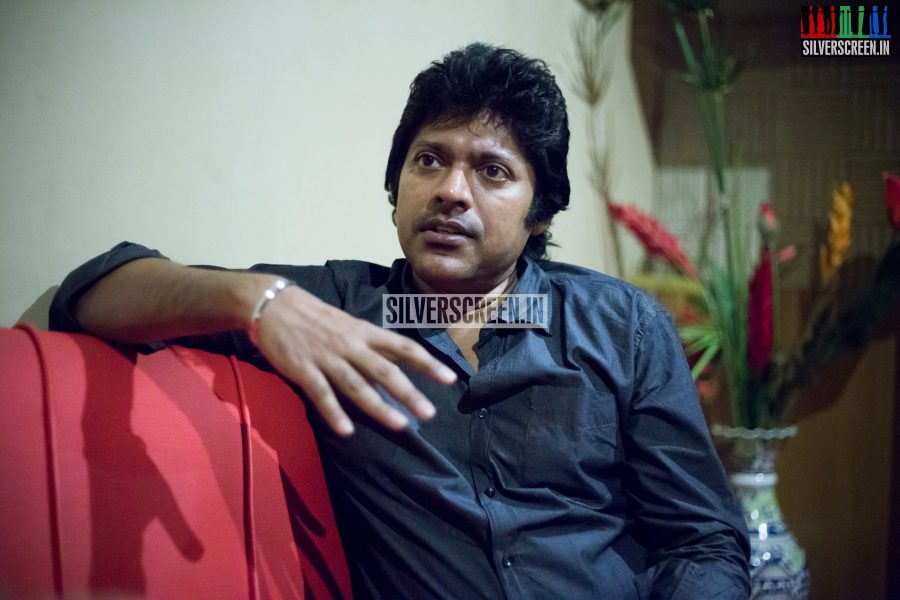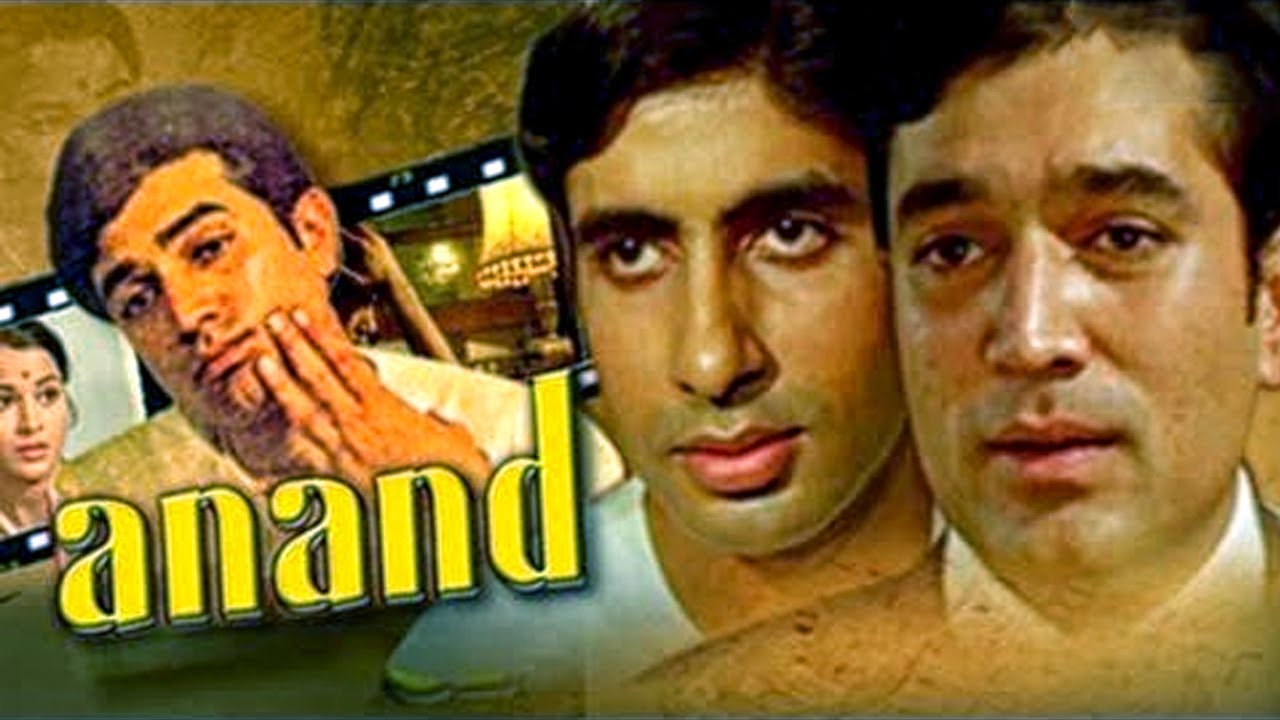Magilzh Thirumeni is measured with his words. Quite like Selva – the protagonist in his second film, Thadaiyara Thakka. He is cautious with his responses, listening keenly to my questions and taking his time to think his answers through.
“What’s the right word, what’s the right word,” he mutters to himself.
A moment later, he delivers mot juste. Fluently.
I am not usually reserved, he says. “But it’s an interview. I must only speak what is necessary, so I am not misinterpreted.”
This interview would have been a breeze to remember even if I hadn’t recorded our conversation.
*****
The Four Frames sound mixing studio is situated in an unassuming residential area. And this is where Magilzh likes giving interviews, his assistant says as he ushers me into the dark building. Magilzh waits for me in one of its dimly-lit rooms. A sound-recording is in session in an adjacent theater.
Heavy beats. The hoarse voice of a man.
Our background music for the interview.
A few minutes into our interview, the voice fades.
*****
Mundhinam Paartheney was Magilzh’s first as director. Out in 2010, it was a rom-com which wasn’t received well. I sheepishly confess to him that I haven’t seen the movie yet. “It’s okay,” he laughs, “not a lot of people have watched it.”
His second, Thadaiyara Thaaka released in 2012. With Arun Vijay and Mamta Mohandas in the lead, it was a “sleeper hit.” The film was made on a shoe-string budget, and it brought in a tidy profit for the producer. Magilzh thinks it could have done better. “Thadaiyara Thaakka released during the IPL season. It wasn’t publicised enough and a big movie released soon after.”
Despite positive word-of-mouth and largely positive reviews, it was removed from theatres just a few weeks after release.
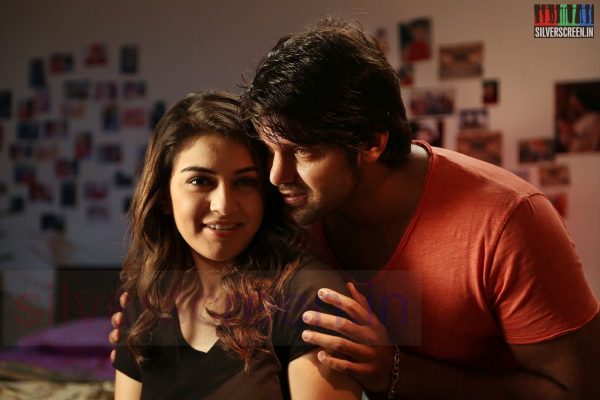
meagamann-movie-stills-050
The story doesn’t end there, though.
The slick thriller now has 30 lakh views on YouTube; having gained cult followers online over the last two years.
He remembers a couple of women – senior citizens – from the censor board, who told him ‘it was a marvellous film, but very raw and violent’. “It’s still a nice compliment,” Magilzh smiles. “I will never show unnecessary violence Thadaiyara Thaakka needed the gore.”
His next film , Meagamann has been awarded a U/A certificate, with a couple of cuts. “I haven’t depicted graphic violence in this movie. The cuts could have been forgiven. But it’s still alright.”
Magilzh then observes that the censor board’s decisions sometimes appear arbitrary. The system lacks uniform application of rules, he says. “I must admit that my films have always been judged fairly. But I only wish that there was more clarity in the system.”
*****
Thadaiyara Thaakka’s story – and its title – travelled with Magilzh for years. When Gautham Vasudev Menon was in the process of penning one of his films, he’d asked his assistants to suggest a title. Magilzh, who was assisting him at that time, proposed Thadaiyara Thaakka, a phrase from the Kanda Sashti Kavasam. “Gautham loved the title,” he recalls. But the film’s producer found it “too chaste”. So, they had to settle for Vettaiyaadu Vilaiyaadu.
Magilzh suddenly becomes very animated. Mentioning Gautham Menon seems to have done the trick. He is also more forthcoming when we discuss Kasthuri Raja and Selva Raghavan, and by extension, his entry into the industry.
*****
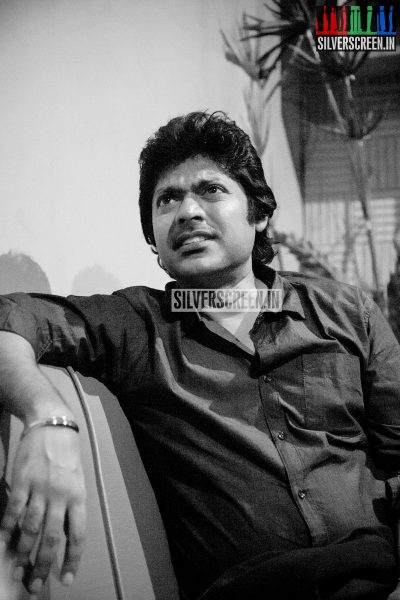
magilzh (7)
He would wait for Kasthuri Raja in his office. For a long time. “Avar room-ku pogumbpothu, oru thadavai thirumbi paathutu povaar. Adhukkaga wait pannuven.”
Fortunately for him, Kasthuri Raja’s glance fell on Magilzh. “I don’t know how a director would gauge a prospective AD. Each director has different ideas. However, most of the time, it’s on a whim,” he chuckles.
Magilzh had a great time working with Kasthuri Raja. “I firmly believe that his first film – En Rasavin Manasile – broke many stereotypes of Tamil cinema. If I create a list of top 50 Tamil movies of all time, En Rasavin Manasile would be on it.”
When Magilzh joined Kasthuri Raja, he was about to begin work on his next film – a coming of age script titled Thulluvadho Ilamai. Kasthuri Raja shot for two weeks, but he was not happy with the output. “Teenage angst was just not his domain.” So, Raja turned to his son Selvaraghavan – who was busy scouting artistes for his first film – for help.
“The bound script that Selvaraghavan was shopping producers for was Kadhal Kondein. It would have been his first film, but the movie did not take off then.” Selvaraghavan joined his father to make Thulluvadho Ilamai. “We knew he would be a better person to translate and execute it,” avers Magilzh.
Thulluvadho Ilamai did not romanticise love, he observes. “It showed teenage love with all its embarrassments, messiness and mistakes. It is one of the most important Tamil movies”
*****
After a couple of years, Magilzh ran into Gautham Menon at editor Suresh Urs’s office. The director had just finished Minnale, and was remaking it in Hindi.
Magilzh was ‘floored’ by Minnale. “For the first time in Tamil, Gautham had portrayed a girl, who – fresh from a recent break-up – did not have any qualms about marrying another guy.” Magizh could relate to the sensibilities portrayed in the film.
That was the kind of woman he had seen in his life.
But most of all, Magilzh was mightily impressed by Gautham because he heard his actors speak good English in Minnale.
‘Yaaruda ivan?’ had been his first thought. And when a weekly published Gautham’s interview a couple of weeks after the release of Minnale, Magilzh burst out laughing. “I saw his picture for the first time. He was totally different from the image that I had in mind!”
The meeting with Gautham at Suresh Urs’s office happened soon after. Without a trace of apprehension, he’d walked up to Gautham, and offered to assist. “It’s one of the most pleasant memories,” Magilzh smiles brightly. Gautham had asked him to join the sets of Kaakha Kaakha the following September. “I was dazed by his unpretentious attitude. I am still in awe of him. If he hadn’t changed after so much success, I don’t think he will ever change.” Gautham has never been bossy with his assistants, he says. “That’s how he is with everybody. Very down-to-earth.”
Magilzh then jests, “I used to tell him, ‘Between the both of us, you have had a head start, you are the engineer, you have made more number of films, but then…I am the better looking one!’”
He laughs heartily.
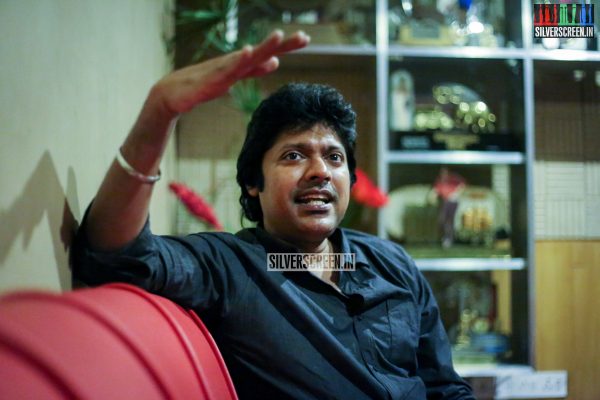
magilzh (12)
Gautham, on the other hand, welcomes ideas from his team, declares Magilzh. He loves collaborative efforts. “But, one style of filmmaking is not superior to the other. Their styles are different, but the result is always brilliant. Quite like Ilaiyaraaja and AR Rahman.”
*****
7G Rainbow colony is Magilzh’s favourite Selvaraghavan film. “The emotions were very real and it dealt with issues that we could relate to. Even some of his bad films have moments that are real and outstanding.” Magilzh loves all of Gautham’s films.
Thadaiyara Thaakka has moments that are reminiscent of Gautham and Selvaraghavan films. Selva (Arun Vijay) takes on a group of thugs all alone, like Kokki Kumar of Pudhupettai. It also has a romance track that is fresh and memorable. Priya (Mamta Mohandas) is not coy, quite like Maya of Kaakha Kaakha. She makes the first move with no reluctance. The couple also discuss intimacy like nobody is watching, similar to Venkatesh and Kalyani of Pachaikili Muthucharam. “Ah, really!” Magilzh says, when I point out. “That’s the kind of woman I like,” he laughs.
“I have always respected strong-willed women; women who can decide for themselves, women who do not wish to compromise on their individuality. I wish you had seen my first film too. It’s heroine-centric,” he frowns. The women in his next film – Meagamann – are cut from the same cloth too. Hansika plays Usha. “But there is another determined woman in the movie who is integral to the script. It’s a surprise.”
Magilzh named his heroine ‘Usha’ because it reminded him of his childhood. “The 80s and 90s,” he says. “I don’t hear the name anymore. It has nostalgic value for me.”
Is it a tribute to someone close? He laughs loudly. It is his constant answer when I try to prod him about something personal.
Magilzh gives in after a while, though. “I was a regular kid in school,” he says, with a “theeraa kaadhal” for poetries and short stories. He breathed books. Puthumaipithan, La Sa Ra, G Nagarajan, and a lot of Russian writers. Magilzh found writing fulfilling.
The first short story that he wrote was about a six-year-old boy “who was seeing his parents falling apart.” The story was penned from his perspective. “I don’t have a copy of it. I would like to know how the story reads now,” he says.
Magilzh was 17 then.
*****
When he was a teenager, Magilzh aspired to write “the Tamil novel.” And, as an aspiring writer, he dabbled in all forms of writing until he stumbled upon script writing, which proved satisfying. Before joining Kasthuri Raja, he worked in the media, penning scripts.
He was smitten with filmmaking by the time he was 20.
Magilzh enjoys writing dialogue for his films. “I make sure they are crisp and not too wordy,” he says. He also ardently follows Faulkner’s advice when it comes to dialogues and scenes. “”Butcher your darlings,” Faulkner had said. “Most of the time, the scenes that we really, really love are not integral to the story. They are conceits of the writer; his attempt to show his brilliance. I try not to be self-indulgent. And I don’t ridicule my audience’s intelligence,” he asserts.
Magilzh is a staunch believer of the Stanislavski system of acting. “Of all theories I’ve read about acting, Stanislavski’s is the one I adhere to. He was a stage actor himself and his system was developed for stage acting. But even after so many years, it is still relevant.”
*****
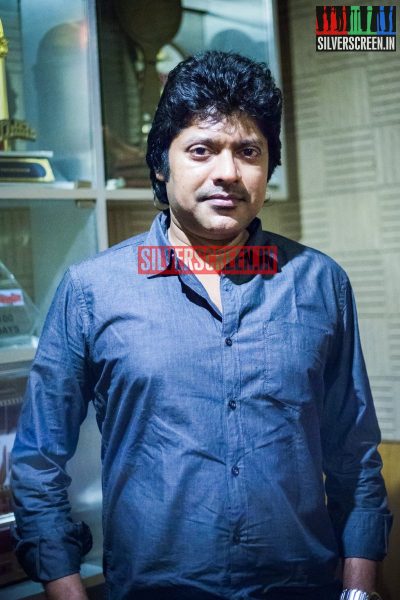
magilzh (10)
Magilzh reckons that a director cannot create another director. “In the industry, nobody will make the effort to to properly train an AD. There is no clear set of instructions on what an AD should do. Kanna katti kaatla vitta maathiri thaan irukkum,” he says. But an AD gets reprimanded for not doing what he did not know was his task in the first place.
“One of the most successful directors who has also nurtured talent well was Balu Mahendra sir,” Magilzh remarks. His assistants have succeeded in making meaningful films. The movies might have bombed at box office, “but I don’t recollect his assistants making a bad film ever.”
Bhrathiraja’s assistants too, fall under the same category. “So do Shankar’s assistants. However, some of their films won’t be considered cinematic achievements 10 year down the line.”
*****
Recommended
Magilzh’s last film, Thadaiyara Thakka was a thriller, and Meagamann is one, too. “The project that I would do after Meagamann is also a thriller,” he says, “But I want to make all kinds of films. There is no pet genre.”
His favourite writer is Shakespeare. “He wrote comedy and tragedy with equal finesse. But Ben Johnson could handle only one. This might sound too conceited and it is an impossibly high aspiration, but I would love to be like Shakespeare, handling all genres. My films should stand the test of time. They have to be multi-layered.”
And only time, Magilzh Thirumeni says, will be a measure of his success.
Meagamann releases today.
*****
The Magilzh Thirumeni interview is a Silverscreen exclusive.
